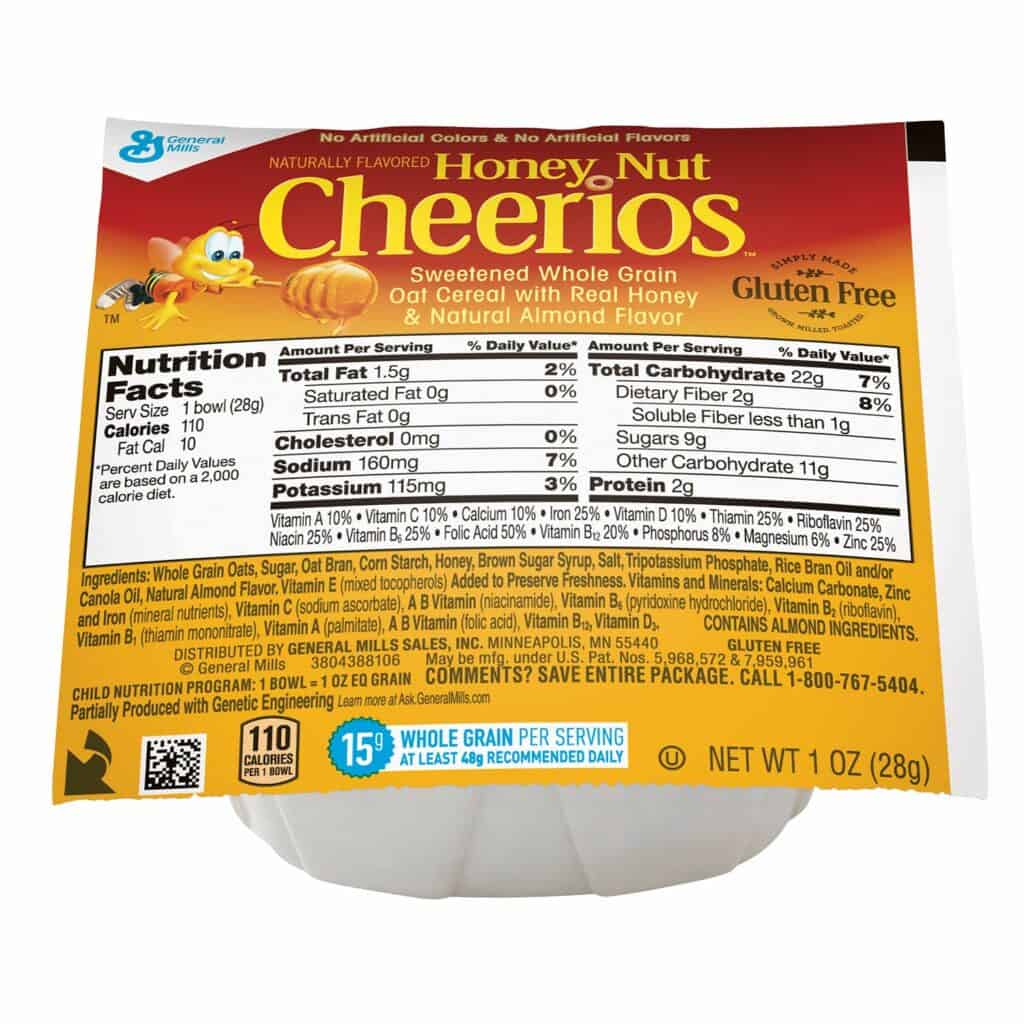Honey Nut Cheerios is a popular breakfast cereal that many adults and children enjoy. However, when it comes to feeding babies, parents may have questions about whether it is safe for their little ones to eat. One common question is Can Babies Eat Honey Nut Cheerios?.
Understanding Honey Nut Cheerios can help parents make an informed decision about whether to introduce it to their baby’s diet. Honey Nut Cheerios is a cereal made from toasted oats and flavored with honey and almonds. It is a sweet and crunchy cereal that is popular among children and adults. However, it is important to note that Honey Nut Cheerios is not a baby food and may not be suitable for infants who are just starting to eat solid foods.
Key Takeaways
- Honey Nut Cheerios is a popular breakfast cereal that many adults and children enjoy.
- Honey Nut Cheerios is not a baby food and may not be suitable for infants who are just starting to eat solid foods.
- Before introducing Honey Nut Cheerios to a baby’s diet, it is important to seek professional advice and consider safe alternatives.
Understanding Honey Nut Cheerios
Honey Nut Cheerios is a popular breakfast cereal that is enjoyed by many. It is a variant of Cheerios, which is a brand of cereal produced by General Mills. Honey Nut Cheerios is made using whole grain oats and is flavored with honey and natural almond flavor.
When it comes to the nutritional value of Honey Nut Cheerios, it is important to note that it contains added sugar and salt. According to the nutrition facts label on the box, one serving of Honey Nut Cheerios (3/4 cup) contains 9 grams of sugar and 140 milligrams of sodium.
The ingredients used to make Honey Nut Cheerios include whole grain oats, sugar, corn starch, honey, brown sugar syrup, salt, tripotassium phosphate, canola oil, natural almond flavor, and vitamin E (mixed tocopherols) added to preserve freshness.
One of the key ingredients in Honey Nut Cheerios is whole grain oats. Whole grain oats are a good source of fiber and can help lower cholesterol levels. However, it is important to note that Honey Nut Cheerios contains added sugar, which can have negative health effects if consumed in excess.
In conclusion, Honey Nut Cheerios is a popular breakfast cereal that is made using whole grain oats, honey, and natural almond flavor. While it does contain added sugar and salt, it can still be enjoyed in moderation as part of a balanced diet.
Nutritional Value of Honey Nut Cheerios
Honey Nut Cheerios is a popular breakfast cereal that is enjoyed by many people, including babies. The cereal is made from whole grain oats and honey, and it is fortified with vitamins and minerals to provide a balanced breakfast option. In this section, we will discuss the nutritional value of Honey Nut Cheerios and how it can benefit babies.

Vitamins and Minerals
Honey Nut Cheerios is fortified with several vitamins and minerals, including vitamin C, vitamin B6, vitamin B12, iron, zinc, and calcium. These nutrients are essential for the growth and development of babies, and they can help support a healthy immune system, strong bones, and cognitive function.
Calcium
Calcium is an important mineral that is essential for the growth and development of strong bones and teeth. Honey Nut Cheerios is fortified with calcium, which can help ensure that babies are getting the nutrients they need to support their bone health.
Zinc
Zinc is an essential mineral that plays a role in many bodily functions, including immune system function, wound healing, and cell growth and division. Honey Nut Cheerios is fortified with zinc, which can help support a healthy immune system and promote overall growth and development in babies.
Iron
Iron is an important mineral that is essential for the production of red blood cells and the transportation of oxygen throughout the body. Honey Nut Cheerios is fortified with iron, which can help prevent iron deficiency anemia in babies and promote healthy growth and development.
In conclusion, Honey Nut Cheerios is a nutritious breakfast option that can benefit babies by providing them with essential vitamins and minerals that support their growth and development. However, it is important to note that babies under one year of age should not consume honey due to the risk of infant botulism.
Babies and Solid Foods
Introducing solid foods to babies is an exciting milestone for parents and caregivers. However, it is important to follow safe feeding practices to ensure the baby’s health and safety. The American Academy of Pediatrics recommends introducing solid foods to babies at around 6 months of age, when they are developmentally ready and able to sit up with support.
When introducing solid foods, it is important to start with single-ingredient foods and gradually introduce new foods over time. This allows parents to identify any potential food allergies or sensitivities. Babies may also need time to develop their pincer grasp and fine motor skills to self-feed.
Baby-led weaning is a popular feeding method that encourages babies to self-feed and explore different textures and flavors. This method involves offering soft, age-appropriate foods that the baby can pick up and eat on their own. Honey Nut Cheerios, however, are not recommended for babies under 1 year of age due to the risk of botulism.
In summary, when introducing solid foods to babies, it is important to follow safe feeding practices, start with single-ingredient foods, and gradually introduce new foods over time. Baby-led weaning can be a great way to encourage self-feeding and exploration, but it is important to avoid certain foods, such as honey, until the baby is at least 1 year old.

Potential Risks of Honey Nut Cheerios for Babies
While honey nut cheerios may seem like a harmless snack for babies, there are some potential risks that parents should be aware of.
One of the main concerns is the presence of honey in the cereal. Honey is known to contain bacteria and spores that can cause infant botulism in babies under 12 months of age. Clostridium botulinum is the bacteria responsible for producing botulism spores, which can grow and multiply in the intestines of infants and produce toxins that can lead to serious health complications.
Another concern is the presence of glyphosate, a herbicide commonly used in the production of genetically modified organisms (GMOs). Glyphosate has been classified as a probable human carcinogen by the International Agency for Research on Cancer (IARC) and has been linked to a number of health problems, including developmental and reproductive issues.
While the Environmental Working Group (EWG) has found traces of glyphosate in some samples of honey nut cheerios, it is important to note that the levels detected are well below the safety limits set by regulatory agencies.
Overall, while honey nut cheerios may be a tasty snack for older children and adults, parents should exercise caution when giving them to babies. It is recommended that babies under 12 months of age avoid honey altogether, and that parents choose organic, non-GMO cereals whenever possible.
Health Concerns Associated with Honey Nut Cheerios
Honey Nut Cheerios is a popular cereal option for many families, including those with infants and young children. However, there are some health concerns that parents should be aware of when considering feeding their babies Honey Nut Cheerios.
One concern is the sugar content in Honey Nut Cheerios. While the cereal does contain honey, which is a natural sweetener, it also contains added sugars. A 3/4 cup serving of Honey Nut Cheerios contains 9 grams of sugar, which is about 2 teaspoons. This amount of sugar may contribute to tooth decay and other health issues if consumed in excess.
Another concern is the salt content in Honey Nut Cheerios. A 3/4 cup serving of the cereal contains 140 milligrams of sodium. While this is not a significant amount, it may contribute to high blood pressure if consumed in excess.
Constipation is another potential issue associated with feeding babies Honey Nut Cheerios. The cereal is low in fiber, which can contribute to constipation in some babies. It is important to ensure that babies are getting enough fiber in their diets to prevent this issue.
Allergies are also a concern when it comes to Honey Nut Cheerios. The cereal contains wheat and may contain traces of nuts, which can trigger allergic reactions in some babies. Parents should be aware of any allergies their babies may have before feeding them Honey Nut Cheerios.
Overall, while Honey Nut Cheerios can be a convenient and tasty option for babies, parents should be aware of the potential health concerns associated with the cereal. It is important to monitor sugar and salt intake, ensure adequate fiber intake, and be aware of any allergies.
Safe Alternatives to Honey Nut Cheerios
When it comes to introducing solid foods to babies, it is important to ensure that they are safe and healthy. While honey nut cheerios might be a popular breakfast choice for adults, they are not recommended for babies under the age of one year due to the risk of infant botulism. However, there are several safe and healthy alternatives that parents can offer their babies.
Original Cheerios
Original Cheerios are a great alternative to Honey Nut Cheerios. They are low in sugar and do not contain any honey, making them safe for babies to eat. They are also fortified with iron, which is important for a baby’s growth and development.
Fruits and Vegetables
Fruits and vegetables are a great source of vitamins and minerals for babies. They can be mashed or pureed to make them easier for babies to eat. Some examples of baby-friendly fruits and vegetables include mashed avocado, pureed sweet potato, and mashed banana.
Puffs
Puffs are a popular snack for babies and are a great alternative to cheerios. They are easy for babies to pick up and eat, and come in a variety of flavors. Some popular brands of baby puffs include Gerber Puffs and Happy Baby Puffs.
Toast with Cheese or Almond Butter
Toast with cheese or almond butter is a great breakfast option for babies. It provides a good source of protein and can be easily cut into small pieces for babies to eat. However, it is important to ensure that the cheese is pasteurized and that the almond butter does not contain any added sugar or salt.
Eggs
Eggs are a great source of protein and can be scrambled or boiled for babies. However, it is important to ensure that the eggs are fully cooked and that there are no signs of pink or runny yolk.
Meats and Fish
Meats and fish are a great source of protein and iron for babies. They can be pureed or mashed to make them easier for babies to eat. However, it is important to ensure that the meat or fish is fully cooked and that there are no bones present.
Dairy
Dairy products such as yogurt and cottage cheese are a great source of calcium for babies. However, it is important to ensure that the dairy products are pasteurized and do not contain any added sugar or salt.
Overall, there are many safe and healthy alternatives to Honey Nut Cheerios that parents can offer their babies. By providing a variety of foods, parents can ensure that their babies are getting all the nutrients they need for healthy growth and development.
Seeking Professional Advice

When it comes to feeding your baby, it’s always a good idea to seek professional advice. Parents may have questions about introducing new foods to their baby’s diet, including whether or not babies can eat Honey Nut Cheerios. Seeking advice from a pediatrician or doctor can help ensure that your baby is getting the proper nutrition and avoiding any potential health risks.
The American Academy of Pediatrics recommends that babies be exclusively breastfed for the first six months of life, and then gradually introduced to solid foods. However, they do not specifically mention Honey Nut Cheerios in their guidelines. It is always best to consult with a pediatrician or doctor before introducing any new foods to your baby’s diet.
The American Heart Association recommends limiting added sugars in children’s diets, including honey. Honey Nut Cheerios contain honey as an ingredient, so parents may want to consider this when deciding whether or not to give their baby Honey Nut Cheerios. Again, consulting with a pediatrician or doctor can help parents make informed decisions about their baby’s diet.
In summary, while Honey Nut Cheerios may seem like a tasty and convenient snack for babies, it’s important to seek professional advice before introducing them to your baby’s diet. Consulting with a pediatrician or doctor can help ensure that your baby is getting the proper nutrition and avoiding any potential health risks.
Conclusion
In summary, babies under the age of one should not be given honey nut cheerios due to the risk of botulism. Honey, including honey nut cheerios, contains spores of the bacterium Clostridium botulinum, which can produce toxins that can cause serious illness or even death in infants.
While honey nut cheerios may be a convenient and tasty snack for older children and adults, they are not appropriate for babies. Instead, parents should choose age-appropriate foods that provide the necessary nutrients for their baby’s growth and development.
It is important to note that moderation is key when it comes to feeding babies. Overfeeding or underfeeding can lead to health problems, so it is important to follow recommended feeding guidelines and consult with a healthcare provider if there are any concerns about a baby’s nutrition or growth.
Overall, parents should prioritize their baby’s health and nutrition by choosing safe and appropriate foods, including avoiding honey and honey-containing products like honey nut cheerios until their baby is at least one year old.
Related Posts:
Frequently Asked Questions
Are Honey Nut Cheerios safe for infants to eat?
Honey Nut Cheerios are not recommended for infants under 12 months old due to the potential risk of botulism. Infants’ digestive systems are not yet fully developed and may not be able to handle the bacteria that can be found in honey.
Is it okay for a 13 month old to eat Honey Nut Cheerios?
Yes, a 13 month old can safely eat Honey Nut Cheerios as long as they do not have any nut allergies. It is important to monitor your child while they are eating and ensure they are chewing the cereal thoroughly to avoid choking.
What are the ingredients in Honey Nut Cheerios?
The ingredients in Honey Nut Cheerios include whole grain oats, sugar, oat bran, corn starch, honey, brown sugar syrup, salt, tripotassium phosphate, canola oil, natural almond flavor, and vitamin E.
Can infants get botulism from Honey Nut Cheerios?
Infants under 12 months old should not consume Honey Nut Cheerios due to the potential risk of botulism. The bacteria that can cause botulism can be found in honey, which is an ingredient in Honey Nut Cheerios.
At what age can babies eat Cheerios?
Babies can start eating Cheerios around 8-10 months old, as long as they are able to sit up and have developed the ability to pick up and eat small pieces of food. It is important to monitor your child while they are eating and ensure they are chewing the cereal thoroughly to avoid choking.
What are the risks of giving honey to babies?
Honey should not be given to infants under 12 months old due to the potential risk of botulism. The bacteria that can cause botulism can be found in honey, and infants’ digestive systems are not yet fully developed and may not be able to handle the bacteria.

Iesha is a loving mother of 2 beautiful children. She’s an active parent who enjoys indoor and outdoor adventures with her family. Her mission is to share practical and realistic parenting advice to help the parenting community becoming stronger.
